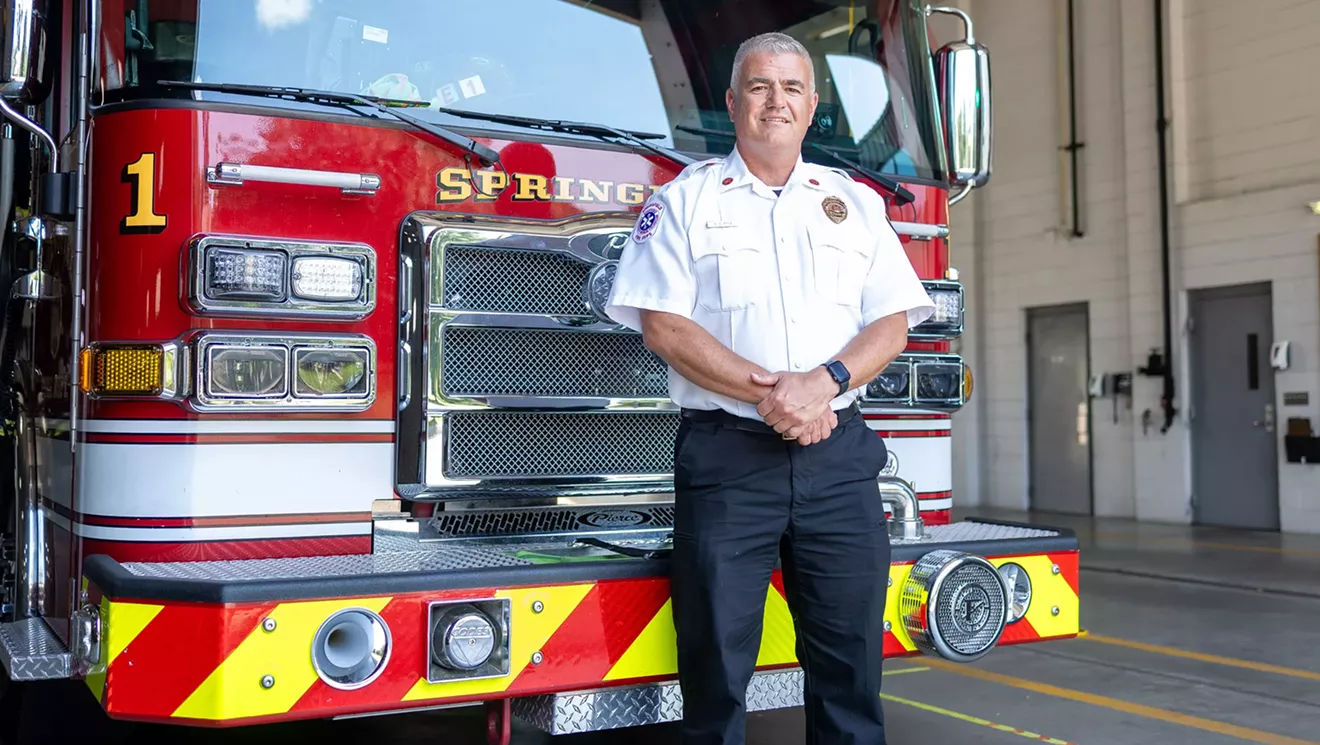
PHOTO BY ZACH ADAMS
Fire Chief Nick Zummo says SFD has started using a third-party company to bill insurance companies and businesses – not individual city residents – for services rendered.
First come the firefighters, then come the bills.
After responding to a fire or medical emergency, the Springfield Fire Department is sometimes sending out bills seeking reimbursement for services rendered.
The policy, which has been in place less than a year, has raised some eyebrows. After all, aren’t these services already paid for by city taxpayers?
Fire Chief Nick Zummo said the city is imposing the fees for two reasons: funding the department and deterring private businesses, such as nursing homes, from using firefighters to do jobs better performed by their own staff.
But Zummo emphasizes that the bills are going to insurance companies and businesses – not individual city residents.
“We’ve had some billing issues where some residents received bills in error that should have gone to their insurance companies,” he said. “And those have been cleaned up. The billing company made a mistake and when they’ve reported them, we followed up and made them right. … We’re not billing anyone personally. As, far as we’re concerned, they’re taxpayers and we are a service provided to the community.”
But billing the insurance company can still adversely affect local taxpayers.
For example, a longtime Springfield landlord had a garage fire on one of his properties earlier this year and his insurance company received a bill for $4,000.
“That meant the insurance company was going to pay me $4,000 less to repair the property,” he said. “My first reaction was: Why is the fire department sending out bills? Isn’t this service covered by the taxes I pay to the city?”
The landlord, who asked not to be identified, said after contacting the fire department he was able to get the fee waived.
Bob Passmore, vice president for personal lines with the American Property Casualty Insurance Association, said municipal ordinances such as the one the city of Springfield passed last November usually crop up after a private collection business makes a pitch to a municipality.
However, Passmore said these fees are generally imposed by volunteer fire departments, not professionally run agencies such as Springfield.
“It doesn’t usually apply to places where you pay taxes to pay for the fire department. We’ve occasionally seen legislation that facilitates these kinds of billing schemes. (American Property Casualty Insurance Association) is always opposed. No. 1, you’re assuming that it’s covered by insurance, and it’s often not. No. 2, it’s just not good public policy because you’re funding this through a backdoor tax on individuals and their insurance policies. And that’s not a good practice when you’re funding your first responders.”
SFD has partnered with Fire Recovery USA, a company whose website touts it as the “leading cost-recovery service in the U.S.,” citing more than 1,900 customers in 43 states. The ordinance outlines hourly rates ranging from $554 to $838 per hour for motor vehicle incidents and fires, depending on the severity of the incident. Additional services such as extrication and creating a landing zone incur add-on charges.
“We’ve hired a third party that is kind of crunching the numbers for us and looking where some of this billing can take place,” Zummo said. “It’s a few thousand dollars here and there. It’s not by any means going to offset any of our major costs.
“We looked at some of our comparable communities – Decatur and Peoria and others – and we saw that it has become commonplace to have this type of ordinance in place to recoup some of the costs,” he said.
A separate ordinance passed last month allows the fire department to bill nursing homes when firefighters are called to help lift a resident who has fallen.
“It’s designed to not make money as much as to deter those businesses from leaning on the government to basically provide what they should be providing the residents on their own,” Zummo said.
John Buckley, executive director of the Illinois Fire Chiefs Association, said service fees are part of a trend.
“Many, many fire departments and districts are moving to charging fees for the services they provide,” he said. “It’s basically to help fund the service and to allow the tax rate to remain low and not have to assume the whole cost through a tax rate.”
Buckley said when firefighters are helping lift someone at a nursing home, they aren’t readily available to respond to emergencies.
“It’s a very complicated issue in some respects. Is this an attempt to recoup costs of service or is this to dissuade people from calling for emergency services? As a general rule, you don’t want to dissuade people for calling when they have an emergency. However, a lift in a nursing home is one of those situations where the hope is that by charging a fee, you’re going to prevent those calls from happening.”


